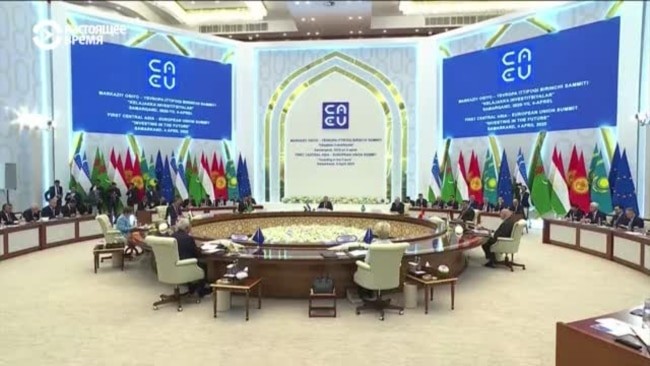The ‘European way’ and the Chinese way in Central Asia
After much hesitation and meetings at the level of individual countries, now in Samarkand the European Union has openly declared its intention to ‘raise relations to the level of strategic partnership’ with the region as a whole. But local leaders, who aim to ‘diversify’ their foreign policy, are waiting to see how many resources Brussels will really put on the table.
Samarkand (AsiaNews) - The first ‘Central Asia - European Union’ summit was held on 3-4 April in Samarkand, one of the most important historical cities in Uzbekistan, to discuss major collaboration and investment projects in trade and infrastructure in a region that has become crucial for the future balance of political and economic relations worldwide.
After much hesitation and meetings at various levels, especially in the ‘5+1’ format (the five countries of Kazakhstan, Uzbekistan, Kyrgyzstan, Tajikistan and Turkmenistan with individual countries such as Germany, the USA, China and others), the EU now openly declares its intention to ‘raise relations to a strategic partnership’ with the entire region as a whole, as stated in the official document.
The most critical and urgent areas to be addressed are water resources, rare earths and digital technologies, all sectors in which Central Asians need large resources to avoid remaining on the margins of the international community, and to be able to truly involve local populations. The 27 European countries therefore intend to make operational the project of a new ‘European way’, that of the Global Gateway that has been talked about for some years now, which could represent an effective competitor to the Chinese Belt & Road in the activation of the ‘Trans-Caspian Corridor’ or ‘Middle Corridor’ for transport and connections between China, the whole of Asia, Europe and the West, in some way the international ‘road of the future’, cutting out belligerent Russia.
At the summit the possible extension of the route was discussed, highlighting the importance for Europeans of strengthening their Eurasian position in the face of Russian advances in Ukraine, and therefore on European territory, and not leaving Central Asia to become China's periphery.
However, the role of the EU in the region is not yet well defined, as several analysts have commented. Timur Umarov, a researcher at the Carnegie Centre in Berlin, believes that ‘the Central Asians want a greater EU presence, but the leaders of these states are rather sceptical about it’, as long as the Europeans ‘don't put enough money on the table’, to be able to truly compete with Beijing and Moscow.
The governments of Central Asia still maintain good relations with their former Muscovite overlords, but in these years of dramatic change they are trying to diversify their foreign policy plans more and more, considering the wealth of natural resources that are still largely unexploited.
Diplomatic meetings have therefore multiplied, also with Brussels and the various European countries, above all France and Germany, but Turkey, the United Arab Emirates and other Middle Eastern countries are also playing an increasingly active role in these relations. Above all, of course, China is moving in, as the main trading partner and investor in the Middle East.
Last year President Xi Jinping himself held a summit with the leaders of Central Asia, and trade relations with Beijing are increasing significantly year on year, reaching almost 100 billion dollars in 2024. The European Union has not remained inactive, signing memoranda of understanding and promising tens of billions of investments, also considering the need for Europeans to find new energy sources to replace the block on imports from Russia. The Global Gateway is a very ambitious project, but so far it has remained essentially on paper, as many experts observe, and the Samarkand summit could be the new starting point.
12/02/2016 15:14







.png)










